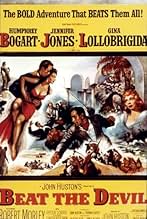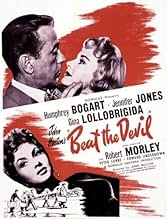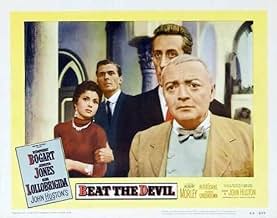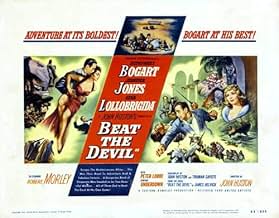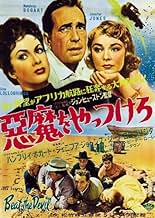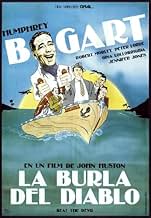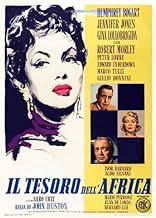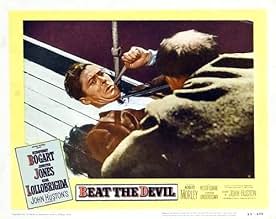CALIFICACIÓN DE IMDb
6.4/10
11 k
TU CALIFICACIÓN
De camino a África hay un grupo de pícaros que esperan hacerse ricos allí y una pareja británica aparentemente inocente. Se encuentran y pasan cosas.De camino a África hay un grupo de pícaros que esperan hacerse ricos allí y una pareja británica aparentemente inocente. Se encuentran y pasan cosas.De camino a África hay un grupo de pícaros que esperan hacerse ricos allí y una pareja británica aparentemente inocente. Se encuentran y pasan cosas.
- Premios
- 1 premio ganado en total
Saro Urzì
- Captain of SS Nyanga
- (as Saro Urzi)
Alex Pochet
- Hotel Manager
- (sin créditos)
Mimmo Poli
- Barman
- (sin créditos)
Argumento
¿Sabías que…?
- TriviaHumphrey Bogart was involved in a serious automobile accident during production of this film, which knocked out several of his teeth and hindered his ability to speak. John Huston reportedly hired a young British actor noted for his mimicry skills to rerecord some of Bogart's spoken lines during post-production looping. Although it is undetectable when viewing the film today, it is Peter Sellers who provides Bogart's voice during some of the scenes in this movie. However this cannot be confirmed.
- ErroresBogie enters the lifeboat wearing a plain suit but gets out wearing a pinstriped suit.
- Citas
Julius O'Hara: Time. Time. What is time? Swiss manufacture it. French hoard it. Italians squander it. Americans say it is money. Hindus say it does not exist. Do you know what I say? I say time is a crook.
- Versiones alternativasThe original American release version was truncated and had scenes moved around, making a mess of the story line. The uncut version--released overseas by Romulus--was finally restored in the U.S. by Sony in 2016.
- ConexionesEdited into Your Afternoon Movie: Beat the Devil (2022)
Opinión destacada
Pleasant enough piffle a mildly diverting comedy-adventure hybrid Beat The Devil has a belated reputation as the last word in dry drollery, an arch in-joke to whose hidden hilarity only the select and sophisticated few are privy. Humphrey Bogart didn't think so, saying `Only the phonies think it's funny. It's a mess.' But one of the movie's formidable champions, Pauline Kael, picked up on his line and trumped it: `Yes, but it may be the funniest mess of all time.' Bogart may be the shrewder critic here; after all, he sank his own dough into the venture, which went down like the ill-starred freighter upon which the cast put to sea. Only latterly has it has it acquired dubious `classic' stature.
Beat The Devil (directed by John Huston, who co-wrote the script with the up-and-coming Truman Capote) improvises a loose, comic riff on the international adventure genre. Thankfully, it's not unhinged or absurd enough to be a dreaded `spoof,' and emphatically not one (as it's become a commonplace to assume) of the noir cycle. In narrative, point of view and look (there's no coherent visual style), Beat The Devil bears not the slightest resemblance to film noir, which, by this point, was slyly starting to parody itself anyway.
The plot's McGuffin concerns uranium deposits in central Africa, which draw a disreputable and multinational crew of opportunists who hope to strike it rich by sticking it to their various motherlands. The joke lies in that these bumblers keep getting taken in by one another's cover stories, pretensions and lies and falling for one another's spouses. It's not a bad joke, but it needs a bit more rigor to flesh it out from a skit to a feature film.
Of course it's funny, if haphazardly. A blonde Jennifer Jones, juggling an English accent as if with a mouth full of prunes, comes straight out of screwball comedy (who knew?), and Gina Lollobrigida (when not waylaid by her own attempts at English) occasionally matches her. Peter Lorre, looking much like the short and rotund Capote of the future, again displays his instinctive flair for subversive comedy (his past in sinister parts limited what might have been a long and enjoyable career). And Robert Morley, crisp as a toasted if unusually thick crumpet, serves up every line like a butler bearing a decanter of vintage port. Bogart, on the other hand, can't persuasively hide his age and infirmity, and his role as debonair lover and man of action demands superhuman suspension of disbelief (maybe he was just thinking of all the money he was going to lose).
Yet having fun doesn't have to mean that plot is irrelevant, some boring old rule made to be broken. Part of the movie's folklore is that Capote stayed up all night writing the next day's pages; maybe so, but didn't he or Huston know where they were going? Once the characters wade up on the North African shore to be apprehended by `Arabs' (surely, Bedouins?), there's no more pretense of a cohesive script or a halfway satisfying storyline. Finding a plausible way out of all the intrigue, however tongue-in-cheek it might have been, wouldn't have killed the laughs, now, would it?
Beat The Devil (directed by John Huston, who co-wrote the script with the up-and-coming Truman Capote) improvises a loose, comic riff on the international adventure genre. Thankfully, it's not unhinged or absurd enough to be a dreaded `spoof,' and emphatically not one (as it's become a commonplace to assume) of the noir cycle. In narrative, point of view and look (there's no coherent visual style), Beat The Devil bears not the slightest resemblance to film noir, which, by this point, was slyly starting to parody itself anyway.
The plot's McGuffin concerns uranium deposits in central Africa, which draw a disreputable and multinational crew of opportunists who hope to strike it rich by sticking it to their various motherlands. The joke lies in that these bumblers keep getting taken in by one another's cover stories, pretensions and lies and falling for one another's spouses. It's not a bad joke, but it needs a bit more rigor to flesh it out from a skit to a feature film.
Of course it's funny, if haphazardly. A blonde Jennifer Jones, juggling an English accent as if with a mouth full of prunes, comes straight out of screwball comedy (who knew?), and Gina Lollobrigida (when not waylaid by her own attempts at English) occasionally matches her. Peter Lorre, looking much like the short and rotund Capote of the future, again displays his instinctive flair for subversive comedy (his past in sinister parts limited what might have been a long and enjoyable career). And Robert Morley, crisp as a toasted if unusually thick crumpet, serves up every line like a butler bearing a decanter of vintage port. Bogart, on the other hand, can't persuasively hide his age and infirmity, and his role as debonair lover and man of action demands superhuman suspension of disbelief (maybe he was just thinking of all the money he was going to lose).
Yet having fun doesn't have to mean that plot is irrelevant, some boring old rule made to be broken. Part of the movie's folklore is that Capote stayed up all night writing the next day's pages; maybe so, but didn't he or Huston know where they were going? Once the characters wade up on the North African shore to be apprehended by `Arabs' (surely, Bedouins?), there's no more pretense of a cohesive script or a halfway satisfying storyline. Finding a plausible way out of all the intrigue, however tongue-in-cheek it might have been, wouldn't have killed the laughs, now, would it?
- bmacv
- 23 ene 2004
- Enlace permanente
Selecciones populares
Inicia sesión para calificar y agrega a la lista de videos para obtener recomendaciones personalizadas
- How long is Beat the Devil?Con tecnología de Alexa
Detalles
Taquilla
- Presupuesto
- USD 1,000,000 (estimado)
- Tiempo de ejecución1 hora 29 minutos
- Color
Contribuir a esta página
Sugiere una edición o agrega el contenido que falta

Principales brechas de datos
By what name was La burla del diablo (1953) officially released in India in English?
Responda

